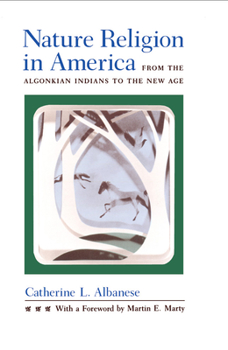Nature Religion in America: From the Algonkian Indians to the New Age
Select Format
Select Condition 
Book Overview
This ground-breaking study reveals an unorganized and previously unacknowledged religion at the heart of American culture. Nature, Albanese argues, has provided a compelling religious center throughout American history.
Format:Paperback
Language:English
ISBN:0226011461
ISBN13:9780226011462
Release Date:September 1991
Publisher:University of Chicago Press
Length:284 Pages
Weight:0.90 lbs.
Dimensions:0.7" x 6.1" x 9.1"
Customer Reviews
2 ratings
Indispensible for studying U.S. Religious History
Published by Thriftbooks.com User , 19 years ago
Catherine Albanese's treatise on Nature Religion in the U.S. is probably her best known work, although it is by no means her only area of focus. In this volume, she defines and defends what she calls "Nature Religion." And its an impressive set of drawn-out sketches and themes-- admittedly just one of many possible ways to map this space. Algonkian Amerindian religion is impressively overviewed, and the role of "Nature" here (a European concept) is dissolved into a complex interlocking set of relationships between Powers, Places, and Persons, both Human and Other-Than-Human. For the Puritans, Nature was abstracted into all that was "Other," usually a place of wilderness and evil--a Place to be feared. Although, as Albanese points out, precedents exist in Christian history for the wilderness as a place of testing and purification. The new republicanism from the conservative American "revolution" fostered a "wilderness eucharist" mentality--holding Nature sacred as something to be ingested, thereby becomed (and overcomed). Yet other turns no less revelant today are covered. Transcendentalism and its associated 'heathen' ambiguous reverance for Nature are documented, both in the paradoxical sense of Nature as the Ultimate and Nature as a illusion (or correspondence for the Ultimate. Both of these senses are inherited in contemporary Goddess worship and the different, but related phenomenon of New Age religion, while each of them individually leads Albanese to wilderness preservation ideology and Christian Science/Mind cure movements. For Albanese, this protean concept contains its own multivalency, its own pluralism, and therefore tends to recede in influence and importance the more a particular offshoot institutionalizes and fossilizes. It is a voice more suited to a prophetic mindset than a priestly mindset, although that too could be possible, it seems. Excellent and challenging work to uncover and begin to document this counter-covenantal thread throughout American history and religion. Albanese freely admits to inventing the term herself--but she is correct in that using it as a frame of reference, for both elite and popular culture, for both empirical and cultural facts, tells us something very important about religion in the United States.
good
Published by Thriftbooks.com User , 25 years ago
state living in, name of indians, etc.






